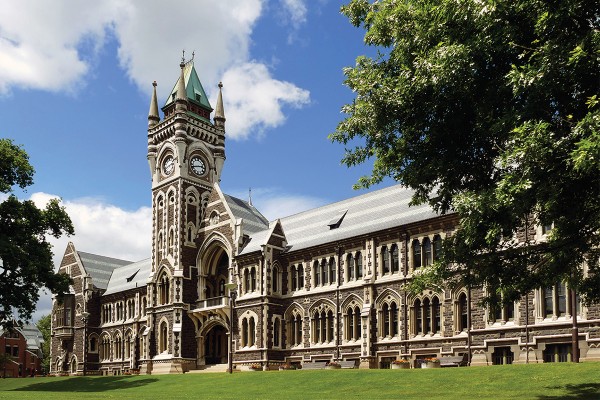The long-awaited results of a University working group on institutional neutrality are out. The University of Otago announced last week that they will be accepting the recommendations of the group’s 25 page report to adopt a statement on institutional neutrality (dubbed “vague and uninspiring” by Otago Staff for Palestine) and will develop ethical investment and procurement policies.
The working group was established last year in response to mounting pressure from the Otago community – staff and students alike – for the University to respond to the genocide in Palestine. Over the past year, Otago campus has seen successive watermelon-coloured rallies led by Otago Students for Justice in Palestine (OSJP) and Otago Staff for Palestine (OS4P) calling on a political stance from the University on the genocide and the adoption of a Boycott, Divestment and Sanctions (BDS) policy.
Otago Staff for Palestine put forward a motion in October last year asking the University to adopt a BDS policy, meaning they wouldn’t do business with any organisations trading with illegal Israeli settlements in occupied Palestinian territories. “The University has said that it has no investments in Israel. So our request for them is to demonstrate that – prove that, conclusively, and then in the future make sure our procurement practices and our investments are done with that in mind. In other words: Yes, our hands are clean and they’re going to stay clean,” OS4P told Critic at the time.
OS4P also commented on the University’s silent stance. “There has been no attempt to even address that particular argument or those particular concerns. Instead, the desire – as with this kind of thing and these kinds of people – has been to stand back and embrace institutional neutrality in the defense of an unethical, or a-ethical position where they don’t have to consider those because they’re too fucking scary.”
Critic Te Ārohi was present at the University Council meeting where the motion was on the agenda. As the formalities of the meeting were carried out, so too was a rally on the front steps of the Clocktower. Lines of Midnight Oil’s ‘Beds Are Burning’ and Tears for Fears’ ‘Everybody Wants to Rule the World’ drifted up from the singing protestors on the front lawn. No one acknowledged chants calling for a ceasefire except for a slight flinch of one member’s shoulders.
Rather than discussing the motion, the Council pressed “pause”, concluding that a working group on institutional neutrality would be the decider. The working group was chaired by Emeritus Professor James Maclaurin and accepted in-person submissions from staff and students. The ODT reported at the time that Vice Chancellor Grant Robertson had expected the report before the end of the year.
Views on the University’s stance have been varied among Otago’s academic community. One senior academic staff member during the consultation process said, “The University is neutral, so that we do not have to be’.” Other staff members have been vocally in favour of the University taking a more front-footed approach. In March, Critic Te Ārohi reported on a seminar hosted by members of OS4P arguing that what is happening in Gaza is genocide, and therefore the global community have a responsibility to do their “utmost” to prevent it. International relations expert Professor Robert Patman said he “[didn’t] see what we’re doing at this university.”
In May – some six months after the Uni Council meeting – the results are in: they will remain neutral. The statement reads: “The University of Otago – Ōtākou Whakaihu Waka adopts a position of institutional neutrality. This means that University leaders will not communicate institutional positions on controversial political topics except where such issues directly impact the University’s role or functions. Examples of such functions are the safety and wellbeing of staff and students, financial and regulatory concerns, sustainability, equity, ethical investment, and obligations under Te Tiriti o Waitangi.”
A plan for “ethical” money-spending is underway, though it’s currently unclear what the University's interpretation of “ethical” will entail and whether students’ vending machines (holding precious study sweet treats) will be affected. Grant explained, “This was a strong message from the consultation process, that staff and students want to see. It is important that how we invest and purchase goods is not only achieving good financial outcomes, but also ones that uphold the University’s values.”
Critic Te Ārohi approached OS4P for comment following the release of the report, who said that they were pleased with the possibility of an ethical investment approach and would like to thank the working group for their “hard work”. They expressed disappointment, however, that the defence of academic freedom was not as “robust” as it could have been and that so many exceptions to such freedom were included.
“If the university is not brave enough to take an ethical position on an ongoing genocide, then there should be a clearer articulation in this text of why institutional neutrality is so important,” said a spokesperson. “The report that the working group produced is much clearer than the statement. As it stands, this statement is vague and uninspiring.” One student commented to Critic that “neutrality helps the oppressor, never the victim”, saying that the Uni “needs to grow a pair and divest”.
“In the face of many things happening in the world today, it is understandable that there are very strong views on political issues held by many people on campus,” said Grant. “I have strong personal views as well. The University not taking a single position on them is not indifference, but rather it is our job to make sure that the right for people to peacefully express their views is upheld.”







